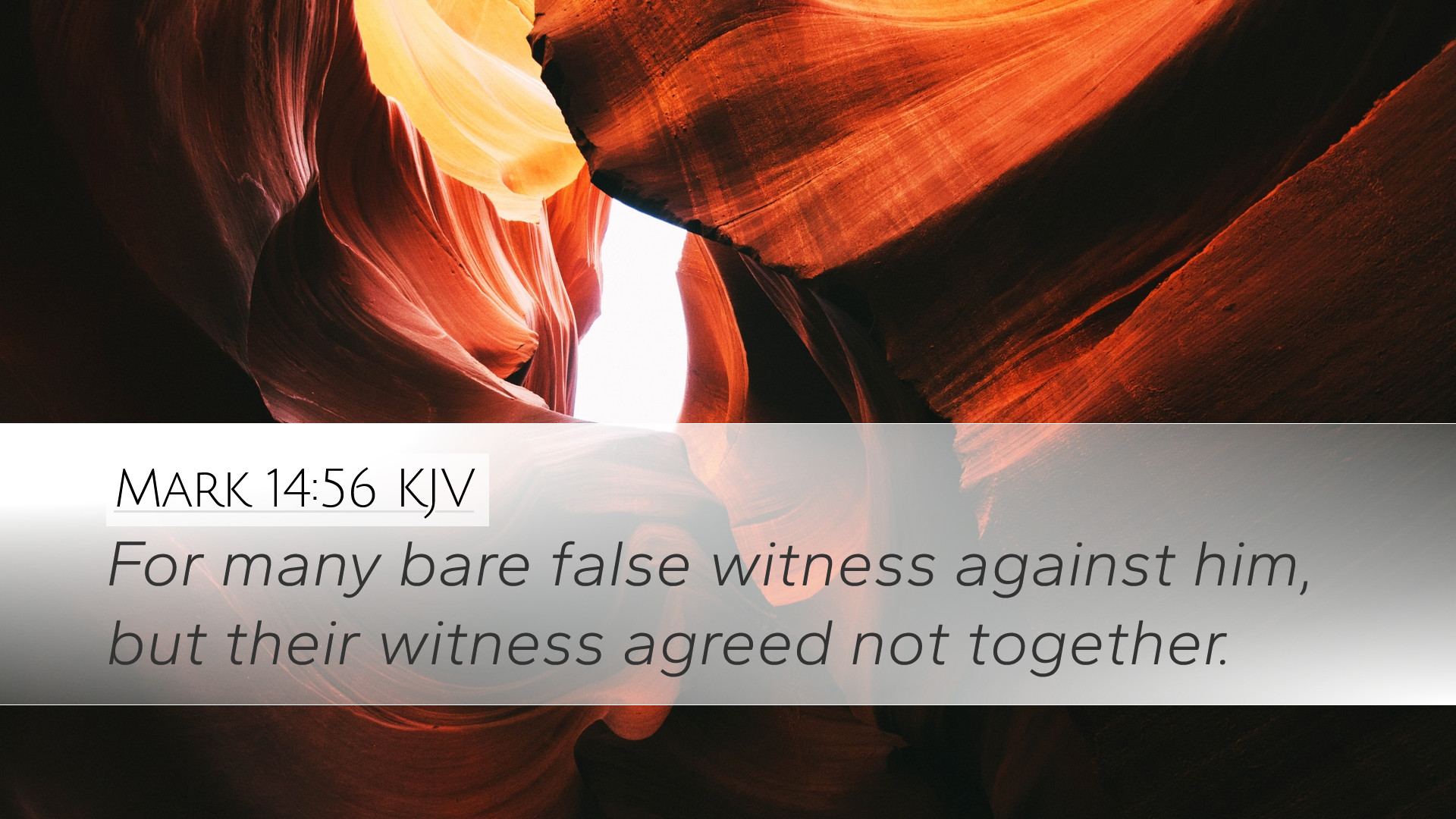Commentary on Mark 14:56
Verse Context: Mark 14:56 states, “For many bore false witness against him, but their testimonies did not agree.” This verse occurs in the context of Jesus’s trial before the Sanhedrin, illustrating the chaotic and unjust proceedings against Him.
Overview of Mark 14:56
This verse highlights the critical nature of Jesus's trial, emphasizing the false accusations presented against Him. The lack of agreement among the witnesses serves to underscore the injustice and falsity permeating the trial. As we explore this verse, we will delve into insights from prominent public domain commentaries, examining the significance of false testimony within the Gospel narrative.
Insights from Matthew Henry
Matthew Henry offers a detailed examination of the various facets of this verse. He points out that the eagerness of the witnesses reflects a deep-seated animosity toward Jesus, which had become increasingly apparent throughout His ministry. Henry notes:
- The Nature of False Testimony: The witnesses' eagerness to bear false witness against Jesus demonstrates the spiritual blindness of the religious authorities. They were motivated by fear and jealousy rather than truth.
- Their Disunity: The conflicting testimonies illustrate that, in seeking to harm Jesus, they only revealed their own lack of integrity. Henry underscores that God allowed this disunity to emphasize the innocence of Jesus.
- Moral Implications: By contrasting these false witnesses with the truth of Jesus, Henry reminds readers of the importance of honesty and integrity in personal conduct, particularly in matters of justice.
Insights from Albert Barnes
Albert Barnes, in his commentary, expounds on the significance of the false witnesses' testimony. He asserts:
- Fulfillment of Prophecy: Barnes notes that the false accusations are part of the prophetic fulfillment concerning the suffering Messiah, suggesting that Jesus’s acceptance of these accusations illustrates His intent to bear the sins of humanity.
- The Role of Falsehood in Legal Proceedings: He emphasizes that false witness in legal contexts is a serious offense. Barnes draws parallels to the legal standards upheld in Israelite law, which strictly prohibited false testimony (Exodus 20:16).
- Spiritual Lesson: Finally, Barnes encourages readers to reflect on the importance of being a witness to the truth in their own lives, contrasting the behavior of these false witnesses with the call to be 'salt and light' in the world (Matthew 5:13-16).
Insights from Adam Clarke
Adam Clarke provides a scholarly perspective on the implications of Mark 14:56, focusing on the nature of the witnesses and their testimony:
- Historical Context: Clarke outlines the historical context of the trial, noting that it was customary for the Sanhedrin to seek multiple testimonies, but the nature of these testimonies was clearly flawed and self-serving.
- Theological Reflection: He reflects on the theological implications of such injustice, considering how it reflects the fallen nature of humanity and the lengths to which people will go to undermine righteousness.
- Call to Justice: Clarke's commentary serves as a reminder for congregations and leaders to prioritize justice and truth, drawing an urgent need for discernment in hearing testimony and making judgments.
Theological Implications
As we examine this verse through the lens provided by various commentators, the broader theological implications emerge:
- The Justice of God: The chaos of this trial reflects the overarching theme of divine justice that resonates throughout Scripture; God sees and will ultimately vindicate injustice.
- The Nature of Truth: In an age where truth is often maligned, this verse challenges believers to uphold truth in every aspect of life, both in speech and action.
- Christ's Fulfillment of Suffering: This moment in Scripture serves as a reminder of Christ's sacrificial love and His experience of injustice, reinforcing the notion that He can empathize with human suffering.
Practical Applications
In light of these insights, several practical applications can be drawn for pastors, students, theologians, and Bible scholars:
- Integrity in Testimony: Individuals are called to be champions of truth in their communities, refusing to engage in slander or falsehood.
- Understanding Suffering: Reflect on the nature of suffering and injustice faced by Christ. This can deepen understanding of human experiences and foster empathy in ministry.
- Promoting Justice: Engage actively in promoting justice within communities, active discipleship involves a commitment to rectifying wrongs and advocating for those oppressed.
- Faith in God’s Sovereignty: Trust in God's divine plan, despite the unjust circumstances that may arise. Remember that He sees all and will bring ultimate justice in His timing.


